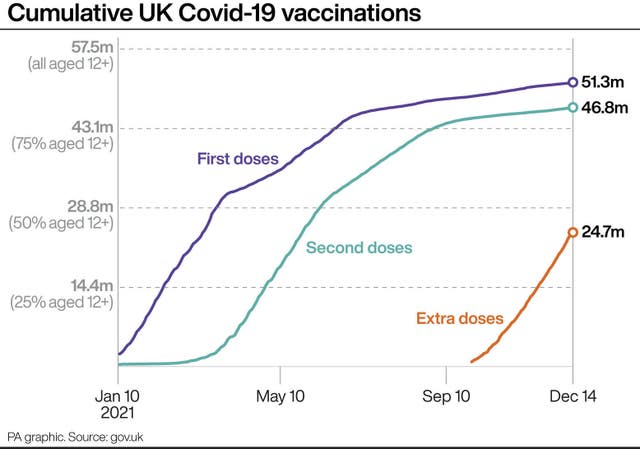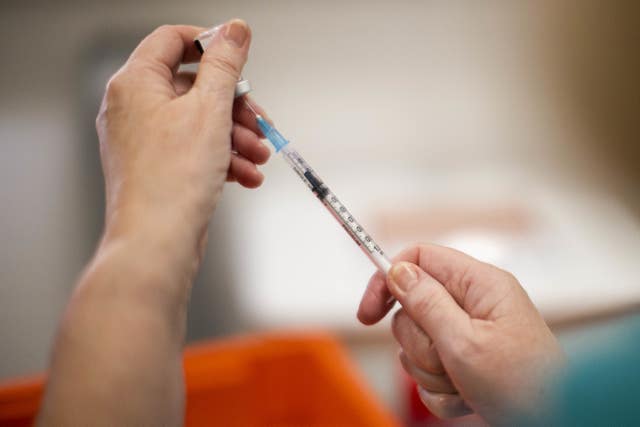Chris Whitty warns against over-interpreting early Omicron data
The chief medical officer said even if the new variant is milder, its ability to spread faster means there could still be an issue.

England’s top medic has warned that early data from South Africa on the Omicron variant should be treated with caution as there is a danger people have over-interpreted it to mean there is no problem.
Professor Chris Whitty said what is lacking currently is “clear data on some of the really key questions”.
The chief medical officer said even if the new variant is milder, its ability to spread faster means there could still be an issue.
He told Wednesday’s Downing Street press conference: “The first caution on this is simply a numerical one – if the rate of hospitalisation were to halve but you’re doubling every two days, in two days you’re back to where you were before you actually had the hospitalisation.
“If the peak of this is twice as great, then halving of the size of the hospitalisation rate, you still end up in the same place. And this peak is going very fast.”
He said it is also important to note that immunity in South Africa is “far higher” in the face of this wave, due to a prior Delta wave and the country’s vaccination programme, adding that that makes their lower hospitalisation rate so far “unsurprising”.
He stated that he remains concerned there will be a problem with Omicron, but the exact nature of it is currently unknown.
He said: “That doesn’t mean that there isn’t some degree of slightly milder disease, that is possible. But I just think there’s a danger people have over-interpreted this to say, ‘this is not a problem and what are we worrying about?’
“I want to be clear, I’m afraid this is going to be a problem. Exact proportions of it, of course, South African scientists and UK scientists and scientists globally are trying to determine at the moment.”
He said the key data needed is on hospital admission, severe disease and mortality rates in people who have had two doses of a coronavirus vaccine, and then data when a booster is taken into account.
He said early indications from laboratory studies are “not really strong enough to be able to make strong clinical recommendations” at this stage.

His comments come after the head of South Africa’s medical association told British MPs that most cases of Omicron in South Africa are mild and after real-world data suggested two doses of the Pfizer vaccine offer 70% protection against hospital admission.
Dr Angelique Coetzee, chairwoman of the South African Medical Association, told the Commons Science and Technology Committee on Tuesday that she agreed with a study from the South African Medical Research Council suggesting that Omicron may be 29% less severe than the first wave of infection that swept the country.
She said “we don’t have all the answers” but added that the clinical picture so far is that people are mostly suffering mild illness from Omicron.
Dr Coetzee said some people are getting breakthrough infections if they are vaccinated or if they have had Covid before, but cases seemed to be milder, especially for the vaccinated.
She said that in hospitals it is hard to differentiate between those patients with the Delta variant and those with Omicron, but that intensive care units “are still not overwhelmed”.
A study, based on preliminary data from the first three weeks of the Omicron surge in South Africa, has suggested that two doses of the Pfizer/BioNTech jab makes vaccinated people 70% less likely to be admitted to hospital compared with those who are unvaccinated.
This is lower than the 93% protection the jabs gave during the Delta wave, but still offers a good degree of protection.

Overall, adults infected with Omicron were 29% less likely to need hospital care compared with earlier variants, the study found.
Younger age groups were slightly less likely to go to hospital than older people, though experts think this may be due to waning immunity in older people who were given their vaccines first.
Dr Michael Head, senior research fellow in global health at the University of Southampton, said the analysis covered just three weeks of data and warned that it was important to “avoid inferring too much right now from any national scenario”.
He added: “For example, the narrative around South Africa is that Omicron may be much milder, whereas reports out of Denmark broadly suggests the opposite.
“This reflects the uncertainty of new data. Within that, factors include the different levels of exposure to Covid-19 and previous infection, levels of vaccination and potential waning of immunity, and also age ranges infected thus far.”





